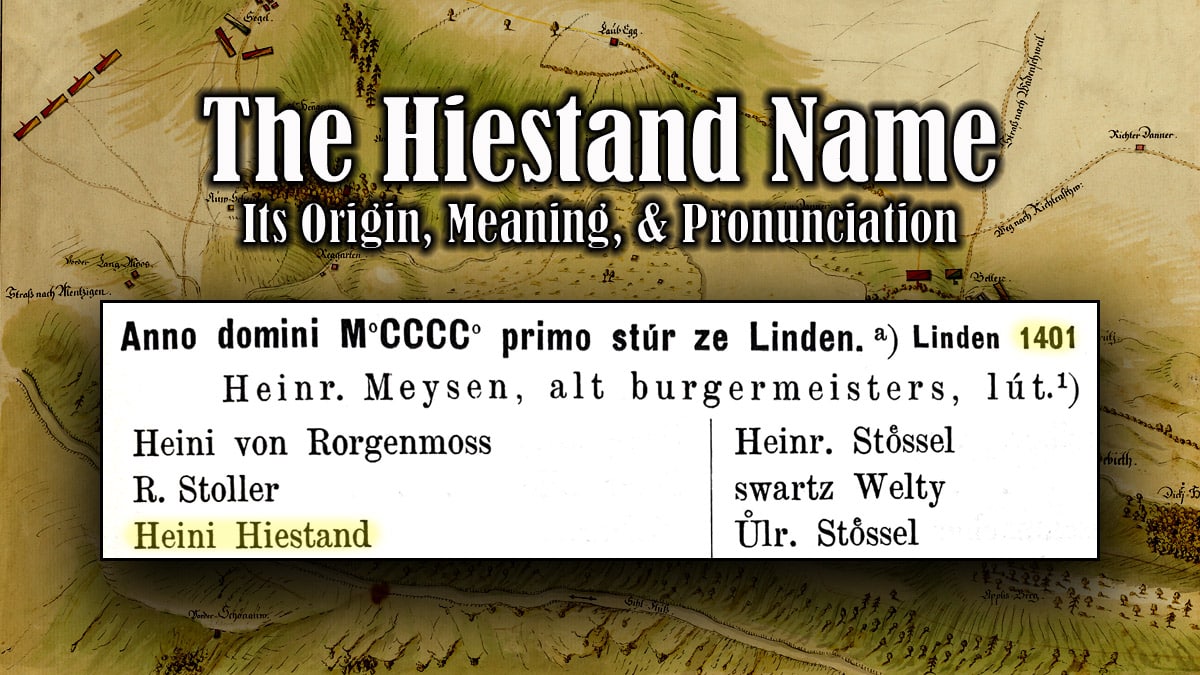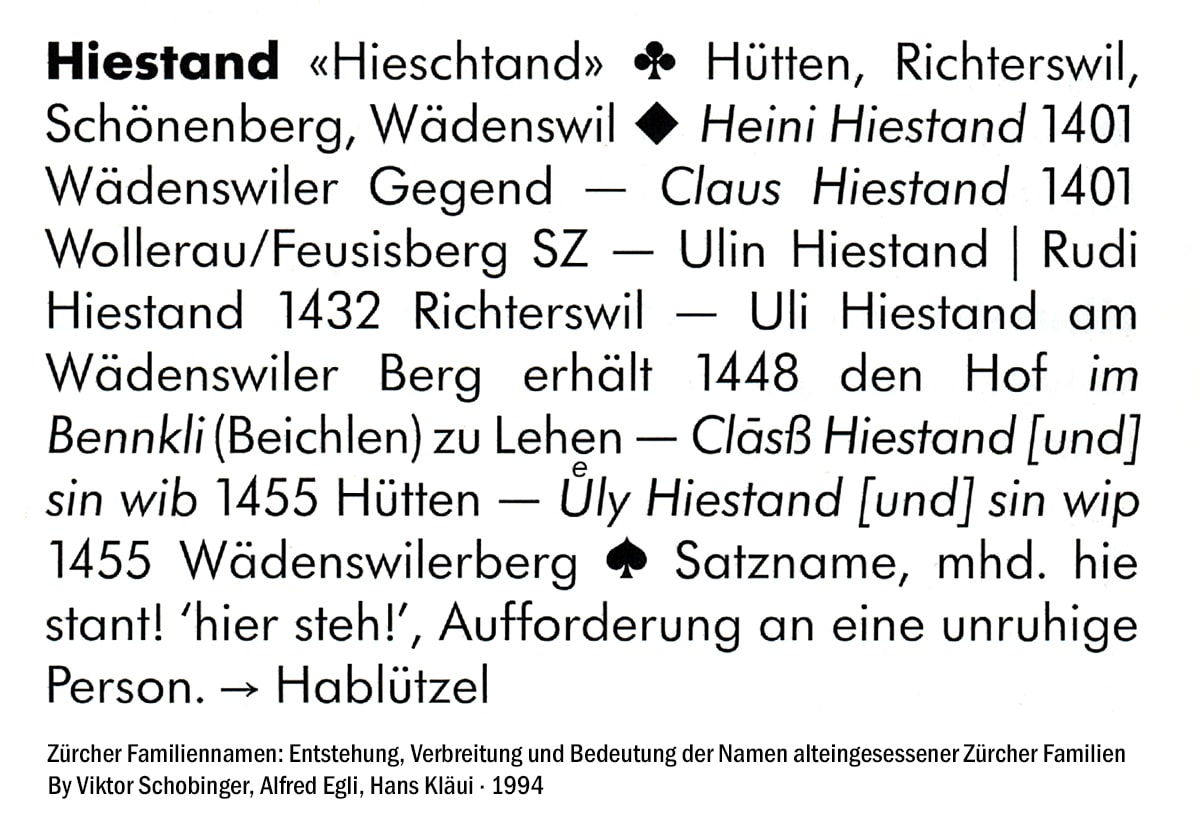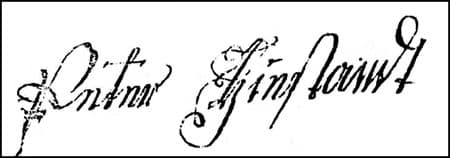The Hiestand Family Name - It's Origin, Meaning, and Pronunciation

Dr. Peter Ziegler (Zürich, Switzerland) and Dr. Wayne Haston (Pennsylvania, USA), Co-Authors
(Including significant research data from Kent Douglas Hiestand)
"Early Swiss Hiestands" Series
German Language Version of this Article
The Hiestand Family Name - Its Origin
Pre-Surname Era
When our ancient Hiestand ancestors settled in Switzerland (whenever that was), they didn’t have a surname. Before the middle of the 13th century AD there were generally no surnames in the canton of Zürich. Since the population, which was not yet numerous, was spread out, name specificity beyond a first name was not necessary. And the simplicity of life in those days required very little personal identification or record keeping.
For the common people there were virtually no public records kept by churches and few by secular scribes. Some pastors could neither read nor write. Before the invention of the printing press by Johannes Gutenberg around 1440, their education consisted primarily of rote memory. And while tax records required a few educated officials, the records were simple, if they existed at all.
First Record of the Hiestand Surname
The earliest known record of the name Hiestand (which is shown in the image above) is Heini Hiestand on a 1401 tax list for a region in the canton of Zürich. Until further evidence proves otherwise, we can assume with a high degree of certainty that our family name originated there. Kent Hiestand specifically stated that “the name Hiestand originated in only one place.” This is unusual for a surname, a family fact we possess that few other families can claim. This “single place” was the mountainside above Wädenswil and Richterswil, on the southern shore near the eastern end of Lake Zürich.
Another source suggests a more specific location, but without clear documented evidence:
Since there are not any records that have been found of the name Hiestand anywhere else for another 200 years, it is safe to assume that the name Hiestand originated in this location and that Heini is very probably the first to use it. Because of how the tax list was taken in order of farms and where Heini was located on the list, I believe he lived on or near the farm on the meadow called Blegi between the Sihl River and the shore of Bibetersee (Lake Hüetten) on the border with Schwyz on Richterswilerberg.
Some 1400s Swiss Hiestands - According to Schobinger, Egli, and Kläus
These authors mentioned Claus Hiestand who, in 1401, was living in Feusisberg, only two and a half miles (four kilometers) over the canton border from Richterswil into Canton Schwyz. As of September 2022, I have been unable to find official records for this Claus Hiestand.

The Hiestand Family Name - Its Meaning
But why was the 1401 Heini Hiestand and his Swiss family given the name “Hiestand”?
Family names, determined by the first bearer of the name, were inherited through generations. Most of them named themselves after their profession or office, but there were other common reasons for the origin of family names. Some names were designated by neighbors who observed them and knew them. There were no regulations from the state or church. Civil registry offices exist in Switzerland only since January 1, 1876.
Occupational names:
Blacksmith, tailor, shoemaker, weaver, bricklayer, butcher, vine man, wine man, miller, fisherman, wainwright, suter, merchant, brickmaker, etc.
From official titles:
Meier = Latin maior. Administrators of noble or ecclesiastical property. Lives on the Meierhof.
Keller = Cellar, Latin cellarius. In the Middle Ages manager of supplies
Schultheiss = mayor ahd sculdheizo = commander. Mayor of a city in the Middle Ages
Vogt = stately, often aristocratic official. Often sees to the mundane affairs of a monastery
Graf = companion of the king, title of nobility in the Middle Ages.
From the first name of the father (Patronymics):
Christen, Peter, Heinrich, Michel
From characteristics of the person (nickname):
Lang = (Long) the long tall man
Kurz = (In short) the small, short man
Dürr = (Skinny) the thin, skinny man
Haupt = (Main) head
Held = (Hero) brave man
From the geographical origin (name of origin):
Zürcher coming from Zurich, Basler from Basel, Zollinger from Zollikon etc.
From peculiarities of the place of residence:
Boller (on the hill), Gubler (on the hill), Egger (at the corner), Locher (in the hole), Walder (near the forest), Tanner (by the firs)
The Hiestand family name emerges from two Swiss-dialect German words, hier stehen. You may read from some sources that the words have the force of an imperative, “stand here.” But according to Dr. Peter Ziegler, eminent Wädenswiler (Zürich) Swiss historian, hier stehen should be translated “here stood.”
I [Peter Ziegler] would classify Hiestand as a nickname or personal characteristics in a new category: i.e. the steadfast, such as: the tall (Lang family), the desert (Wüst family), the short (Short family), the pale (Blass family), the rich (Family Reich), the great (Family Gross), the good (Family Gut), etc.
Perhaps one of our early families was granted rights to a certain plot of land and that is where the family stood, and tenaciously so. Or it could simply mean they were just stubborn people who were known for obstinately taking a stand. We do know from the history of the Wädenswil-Richterswil area that the people there were known for being fiercely independent. And I assume you have probably known some Hiestands (or Hastons) who were stubborn to the core. Or maybe the name originated with an experience in battle, an occasion or reputation of multiple occasions where the family bravely stood their ground in a noble defensive effort. We don’t know the original meaning of the Hiestand name for sure, but we know that they must have been a people who were known for taking a stand and being steadfast.
The "t" Ending to Hiestand

Although the name generally appears ending with a “d,” German-written signatures of Henry Hiestand’s sons, such as those of Peter, in his family Bible record, clearly ended with the consonant “t”—“Hiestandt.” And a 1777 German signature of our Daniel Hiestand/Haston also appears to end with a “t.” Even when English clerks put their English-minded spellings to the Swiss-German surname, sometimes they heard the “t” ending when Henry’s family members pronounced their names, as did the person who recorded the name of “Daniel Hasstont” for the petition to create White County, Tennessee in 1806.
Some Anglicized Alternate Spellings in the United States
Other than the previous addition of “t” to the name for phonetic purposes, the spelling of the family name has remained amazingly consistent for more than six centuries! The H-i-e-s-t-a-n-d spelling of Heini Hiestand’s last name in 1401 is still used by Swiss members of this family today, as well as many who emigrated to America and other countries.
Hiestand or Heistand? Often in the United States, I have found that people sometimes spell the name H-e-i-s-t-a-n-d, with the “e” before the “i.” But, remember this simple rule from English classes: “i before e, except after c.” It is H-i-e-s-t-a-n-d.
However, when Hiestands settled among English-speaking families in America the spelling of the family name morphed into a wide variety of spellings. Hiestands, as well as other German-speaking folks, were generally not English-literate for a generation, or perhaps several generations, after arriving in the New World. Consequently, they were at the mercy of English or Scots-Irish officials for the spelling of “Hiestand.” In some cases, the name simply morphed because the clerks wrote it the way they heard it and the German speakers could not tell the difference until the English-sounding name became the common spelling. In other cases, Deutsch (German-speaking) families intentionally chose to change their names to better fit into English speaking communities and to shield themselves from the anti-Deutsch bias that often existed once they moved away from Pennsylvania and other settlements with large German-speaking populations.
The H-A-S-T-O-N misspelling of Hiestand occurred in at least three official records when Swiss-German Henrich Hiestand’s family was living in the Shenandoah Valley of northern Virginia. When Henrich’s son, Daniel Hiestand, moved to Tennessee, it appears that his two oldest sons (David and Joseph), both of whom were literate in the English language, chose to adopt the Haston spelling. Although the clerks in Tennessee tended to gravitate to more familiar names for their spellings (such as Hasting, Hastin, Hastings, Hasten), David and Joseph Haston consistently spelled their family name H-A-S-T-O-N.
As members of the Tennessee Haston family began to move west, some branches of the family chose to adopt alternate spellings, mostly because they were confused about their European roots. For example, they thought the family originated in England and thought Hasting, Hastings, or Hastain were correct spellings of their name.
The Surname Hiestand - Its Pronunciation
Generally, English speakers who are not familiar with the Hiestand name mispronounce it, which is understandable. Probably the most frequent part of the mispronunciation is the “ie” diphthong that follows “H.”
īIn German the diphthong, ie is generally pronounced like “ee” in English, thus hee-stand. In English ie is sometimes pronounced like “ee” (as in Marie, piece, grief) and other times pronounced like a long “i,” (as in tries, flier, cried). Thus, it is no wonder that many English speakers tend to mispronounce the name as Hī-stand, but it should be pronounced “hee-stand.”
In German you always pronounce the second vowel when IE is used. Therefore HiEstand. But in English sometimes you follow the first letter in Ie. HIestand. -Geni Hiestand
The proper way to pronounce Hiestand is to follow the German pronunciation–Hee-stand.
If you appreciated this article, please share it with others who might also enjoy it.

Join Our June 2023 Hiestand-Haston Tour to Switzerland and Rhineland Germany

Have Mennonite or Amish Roots? - Participate in the DNA Research Project


3 thoughts on “The Hiestand Name – Its Origin and Meaning”
In German you always pronounce the second vowel when IE is used. Therefore HiEstand. But in English you follow the first letter in Ie. HIestand. Thus the confusion about it’s pronouncation.
OMG! That was very detailed information. It must have taken a very long time for you find it all and decipher it all. It is very interesting reading! Congratulations and thank you for putting it together for us.
My mothers family name is Zeiss. Pronounced “z iceâ€